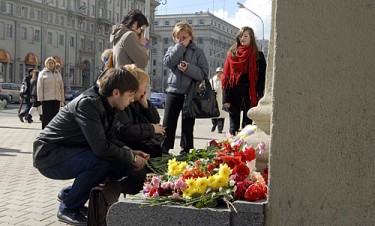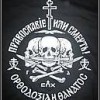 For Newsmill.se: As tens of thousands gather in Moscow and other Russian cities, it is in protest against a corrupt regime, which no longer can provide its people with a belief in the future that might legitimize its further possession of power. The feeling of "we cannot live like this anymore" that became the hallmark of the last days of the soviet empire has reawakened, but the question is only how decisive this feeling will be for the further development of the country.
For Newsmill.se: As tens of thousands gather in Moscow and other Russian cities, it is in protest against a corrupt regime, which no longer can provide its people with a belief in the future that might legitimize its further possession of power. The feeling of "we cannot live like this anymore" that became the hallmark of the last days of the soviet empire has reawakened, but the question is only how decisive this feeling will be for the further development of the country.Russia is currently undergoing one of the most interesting and crucial phases since the Russian revolution. In contrast to the chaotic collapse of the Soviet Union, these are developments that are met with open eyes. Fundamentally, it is a question of whether the political system that has been created may assume the great structural challenges, which the country will meet with over the next decade. In short, all the problems and deficiencies that have been ignored since 1991 will peak around 2020: Demography, infrastructure, economy, environment, health and medical care, education, etc. The list goes on in what seems like eternity, but it essentially means that the people will meet with an increasingly tougher everyday life at the same time as people in power either do not want to or are unable to do anything about it.
The comparison with the dramatic fall of the Soviet Union however risks leading thoughts astray, as the challenges Russia currently is facing are of another character and dignity than was the case 20 years ago. The country instead is sick with a slow but fatal disease if not proper medication is administered. Here, the question is whether Putin and Medvedev are the right doctors.
That we now see people take to the streets and squares on a scale not witnessed since the soviet demise in 1991 is on the surface a consequence of the farcical fraud that took place at the 4 December parliamentary elections. To an even higher degree, it bears witness of a growing popular realization of a profound systemic crisis and that the current regime is uncapable of assuming rising challenges. Power is not even capable of arranging election fraud without it becoming embarrassingly obvious how badly organizsed even the fraud is. For Russians in general it thereby stands beyond doubt that elections are primarily intended for the division of power within the reigning United Russia party and not even represents an approximate popular will. That is an arrogance of power that fewer and fewer Russians are willing to accept.
That a Google search under the Russian term of "party of crooks and thieves" ends up with United Russia as first result is as good an evidence as any of how corrupt the regime is considered. People are simply not prepared to go on along a road chosen that seems to go over the cliffs. The question is how strong and wide the public wrath is and if it is sufficient for continued and increased outdoor protests in sub-zero degrees when the Russian New Year approaches with party and leisure. Disconent with the system still remains and handling it may become a hard task for both Putin and Medvedev for the upcoming 4 March presidential elections. A lot may still happen before then.
What kind of a system is it then that has been constructed during the Putin era and now is questioned by an increasing number of people? Simplified, it is a classic trade-off between power and people. Political power is handed over to an elite in exchange for economic prosperity. From an ideological perspective, Russia's political system is very alarming in combination with a failure of power to deliver on its economic promises.
That civil rights and freedoms have been heavily limited over the last decade has probably been observed by most. These limitations are however not only systematic but depart from an interpretation of the constitution with very reactionary roots. The role ascribed to presidential power under Putin departed from the ideology of the reigning party United Russia, which then was called "sovereign democracy".
The fundament is a system where the president - or sovereign - always has the final say. In its pure form, the president has the constant right to proclaim a state of emergency without democratic accountability.What constitutes a rule of exception, only the president is privy to determine. In essence, it is from this constitutional interpretation that the country's systematic limitations of civil rights and freedom should be perceived. In current Russia the Damocletian sword is constantly hanging over the heads of each and everyone who expresses a divergent view and opposition is considered extremism and an attempt to usurp state power.
Despite president Medvedev's skepticism towards this constitutional interpretation and a high measure of pragmatism in its implementation, it remains a political system practically applied. The practical reason is that supreme political power in Russia has been transformed into a role of arbiter between conflicting political and economic interests, which lack democratic legitimacy and mandate. It is in light of this that the reigning United Russia party should be considered a representation of disparate interests, where primarily Putin but also Medvedev have had to act as arbiters to preserve domestic peace among cynical actors only looking out for their own egotistical interests. As parliamentary elections were carried through, the main purpose was to divide power and positions between different interests within United Russia and not to allow for any expression of real public will.
Why then protest now, in connection to elections to an apparently powerless parliament, when elections for the mighty presidential office awaits in just a few months time? As the Russian electoral system has been designed, it constitutes a two-stage rocket, where parliamentary elections in December determines the division of power within United Russia and presidential elections in March decides who will act as arbiter during the coming six years. That an increasing number of Russians now rise against this system is thus not that strange, as the parliament by way of United Russia symbolizes the corrupt exercise of power felt in everyday life. Protests emanate more from the effects of the system than from its contents.
That the economic component of the trade-off between elite and people has failed is obvious. United Russia's urging the Russians to "enrich yourselves" has not been accompanied by such economic liberalizations that would allow for a wider popular enrichment. Against the background of growing corruption and bribery, today's Russian youth do not consider enterprise and entrepreneurship as a method to reach a reasonable living standard. Instead, the youth is encouraged to seek their livelihood by serving the state within the public sphere. That the future of the young generation would lie within the public sector however rests on the cynical perspective that the more people are corrupted the less will be the interest to upset the fundaments of the system. What stands out is a reality where on the one hand every public office may be purchased at a determined price and on the other hand that the citizens' price list to access public services is decided by the cost of appropriating a public office. As bureaucracy grows, corruption feeds itself and becomes sui generis in a way that lies beyond the bounds of any political exercise of power. In this context, the December parliamentary elections have become a symbol of the corruption and lawlessness, which means that many Russians have lost their fate in the future.
 Considering the fragmented opposition and an almost total lack of political alternative, the political failure of Putin and Medvedev becomes evident. Basically, this failure consists of increasing differences between political vision and reality. Despite the image in the West of great limitations on societal discourse, the discussion of the great challenges Russia is confronting has been both extensive and nuanced, and pointed to both acute and necessary measures from area to area. Most Russians thus know what awaits during the coming years if not drastic and extensive measures are imposed. Putin, Medvedev, and United Russia, have also presented plan after plan, which though have fallen apart when confronted by realities. Plans may be great, but without the capability to implement them, they eventually just end up the object of ridicule. The system's principle for a divsion of power has simply left Russia without a competent and powerful leadership.
Considering the fragmented opposition and an almost total lack of political alternative, the political failure of Putin and Medvedev becomes evident. Basically, this failure consists of increasing differences between political vision and reality. Despite the image in the West of great limitations on societal discourse, the discussion of the great challenges Russia is confronting has been both extensive and nuanced, and pointed to both acute and necessary measures from area to area. Most Russians thus know what awaits during the coming years if not drastic and extensive measures are imposed. Putin, Medvedev, and United Russia, have also presented plan after plan, which though have fallen apart when confronted by realities. Plans may be great, but without the capability to implement them, they eventually just end up the object of ridicule. The system's principle for a divsion of power has simply left Russia without a competent and powerful leadership.Here, primarily Putin has eroded the ground he himself is standing on by allowing for a leader cult of himself. In the official image, Putin is portrayed as the potent, enlightened and determined leader, while Medvedev represents the reform, development, and innovation that will lead Russia towards the future. The image of Putin as the strong-man has though gone so far that he as a person and politician increasingly stands out as almost ridiculous in confrontation with reality.
The people of Russia is today met with a political leadership characterized by impotence and incapability - hopelessly dug down in attempts to balance the internal struggles of the elite over political and economic power. The power's message to the people seems to be: "Stay put in the sinking vessel!" That the people now asks "Can we live like this anymore?" - despite the absence of political alternatives - bears witness to the deep crisis of the system. The question is still if the Russians have concluded that "We cannot live like this anymore." Is it really the case that Russia is awakening out of its torpor by the realization that an authoritarian system cannot solve the challenges of the future?






















